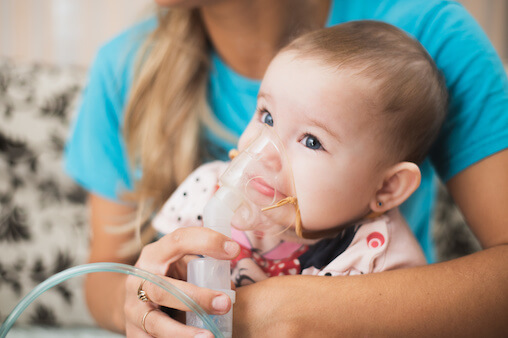
05 Sep Signs of RSV In Babies
2 min. readThere is no end to the different medical concerns and illnesses that can impact your new baby. As a parent this can be very overwhelming as you stay on the lookout for different signs and symptoms of sickness.
One of the more common conditions that parents should be on the lookout for is known as RSV, or Respiratory Syncytial Virus. This is a serious respiratory infection that not only impacts babies, but people of all ages. However, due to your infant’s developing immune system, this type of virus is more serious in little ones than it is in older adults.
RSV is most commonly transmitted between November and April, or the common “cold and flu” season. However, it can be transferred at any time of year. In general, this virus tends to follow a pretty set timeline with symptoms peaking around the 5th day of the illness.
In older children, RSV symptoms can look similar to the common cold, however, in babies, the signs and symptoms of this virus are much more serious. Here are some of the symptoms of RSV:
- Rapid breathing
- Difficulty breathing, or gasping for air
- Fever
- Cough
- Irritability
- Sluggish or lethargic behavior
- Labored use of chest muscles in an attempt to breathe
- Wheezing
- Running nose
It is important to note that certain babies are more vulnerable to RSV symptoms, including premature babies and those who already have existing heart and lung issues.
It is also important to remember that RSV cases can range from a mild to quite severe, and if your baby starts to exhibit some of the more severe symptoms you want to make sure you immediately seek medical care.
- Your baby is dehydrated. This means they aren’t producing tears when they cry and they are developing soft spots known as fontanels.
- Your baby is coughing up thick mucus that makes it harder to breathe. This mucus may be green, gray or yellow in color.
- Your baby has a fever of more than 100.4 degrees (if they are less than 3 months) or 104 degrees if they are older.
- Your baby has a thick discharge coming from their nose that makes it difficult to breathe.
If you are worried that your baby is showing the signs or symptoms of RSV, then it is important that you take them to a doctor. Call us right away here at Continuum Pediatrics at 817-617-8600 to schedule an appointment so we can get your baby the help he or she needs.

